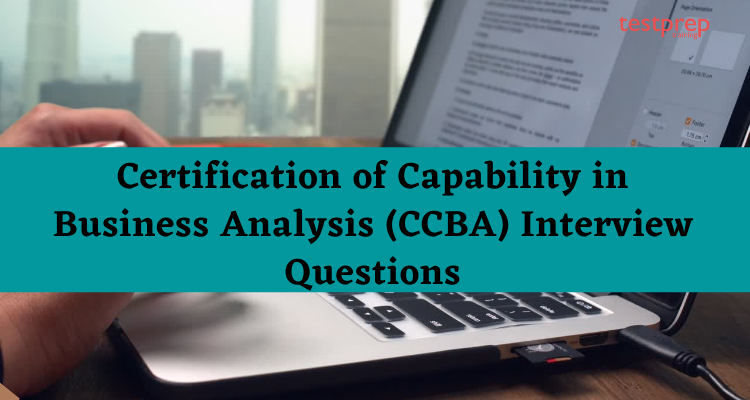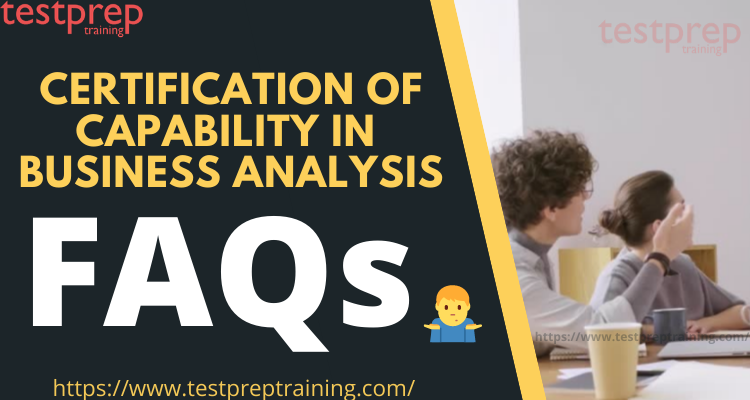CCBA: Certification of Capability in Business Analysis
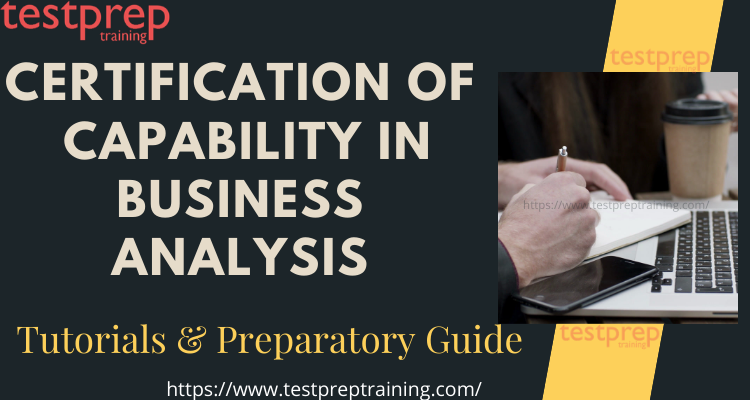
Business Analysts help organisations make the most of data by identifying the latest trends, patterns and errors. They work with data and understand the business side of organisation by their ability to communicate the information to people outside of IT.
Being a lucrative career in the IT domain, the demand of certifications for validation is accelerating. The globally recognised CCBA- Certification of Capability in Business Analysis offered by IIBA helps you prove your mettle and demonstrate your expertise. This certification exam equips you with all the necessary skills for the industry to advance your career.
However, clearing the exam is not so easy. Further, this exam requires preparations from expert guidance and genuine resources. Moreover given its vast syllabus makes it a hard nut to crack. To solve that out, we present you with tutorials and preparatory guide that will aid your journey towards this certification.
What is CCBA Certification?
The CCBA: Certification of Capability in Business Analysis covers the basic skill sets required of business analyst professionals based on the industry standards and benchmarks of the International Institute of Business Analysis (IIBA®) and others. The certificate is suitable for candidates working as business analysis practitioner with approximately 2 to 3 years’ experience, as it helps to recognize their ability to take on larger and or more complex project responsibility.
Business analytics is a lucrative role in IT industry with an average entry-level salary of $67,000 per year. According to PayScale, the average salaries range from $48,000 to $100,000 per year. Moreover, this exam illustrates your professional commitment and guarantees higher growth.
Why choose CCBA Certification?
The CCBA Certification highlights your capability to work effectively with stakeholders, to model business processes, and identify and evaluate opportunities for better business outcomes. This certification represents your skills and knowledge applied to real-life scenarios therefore, makes you stand apart from the non-certified competitors. The benefits that CCBA Certification provides are as follows-

Validates your Skills
The CCBA certification validates your skills and knowledge applied to real-life scenarios and fortifies you for career advancement.
Capability to work
This certification proves your capability to work effectively with stakeholders and the ability to communicate the information to people outside of IT.
Model Business Processes
The Certification of Capability in Business Analysis validates and proves your expertise to model business processes.
Evaluate Opportunities
The CCBA Certification equips you with skills to identify and evaluate opportunities for better business outcomes.
Guarantees Career Growth
In this ever increasing domain of Business Analysis the CCBA Certification guarantees career growth and higher salaries as compared to non-certified candidates.
Digital Badges
IIBA has recently introduced digital badges for all its certification courses. These digital badges are a way to share and validate business analysis certification achievements. Moreover these badges come from a globally recognised organisation hence add value to your academic records and grabs the attention of your potential employers.

Exam Details
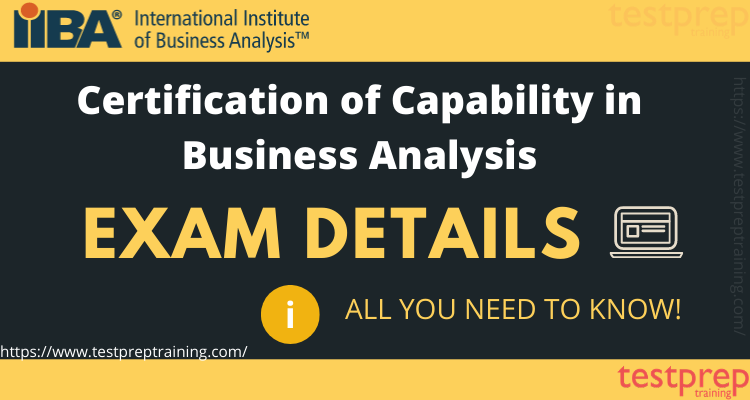
Before venturing into the preparations for the exam, Lets have an idea about the exam details and policies.
The CCBA Certification is a computer-based exam. This exam can be taken online via proctor format or at a PSI test center. It covers a total of 130 questions in a time limit of 3 hours. The exam is in English language.
| Exam Name | Certification of Capability in Business Analysis™ |
| Exam Code | CCBA® |
| Exam Duration | 3 hours |
| Exam Format | Multiple Choice and Multi-Response Questions |
| Number of Questions | 130 Questions |
| Exam Fee | $125 |
| Exam Language | English |
Target Audience
The CCBA certification is specially designed for the following professional
- Individuals with an ECBA™ designation
- Product Managers
- Non-BA consultants
- Trainers
- Hybrid Business Analysis professionals, including: Project Manager, Testers, Quality Assurance (QA) professionals, Change/Transformation Managers, and Designers
CCBA Eligibility
To earn the CCBA designation, you must have the following prerequisite-
- Complete a minimum of 3,750 hours of Business Analysis work experience in the last 7 years.
- Within these 3750 minimum hours required, a minimum of 900 hours must be completed in each of 2 of the 6 BABOK® Guide Knowledge Areas OR, a minimum of 500 hours must be completed in each of 4 of the 6 BABOK® Guide Knowledge Areas.
- Complete a minimum of 21 hours of Professional Development within the last 4 years.
- Provide references.
- Agree to Code of Conduct.
- Agree to Terms and Conditions.
- Pass the exam.
CCBA Exam Requirements
All IIBA Exams are offered as an online proctored one that require the following-
- A desktop or laptop
- An internet connection
- A working webcam
- Microphone
Additionally, your location must support Voice over Internet Protocol (VoIP) in order to complete the exam. Corporate firewalls and VPNs may restrict user access. It is recommended that you use a personal device.
CCBA Application Process
Firstly, Register to become a member of IIBA
You can become a member of IIBA: International Institute of Business Analysis by submitting the fee of $125 USD. This membership offers various benefits but is an optional step in your application process.
Secondly, Log your experience and hours in the IIBA Portal and pay the application fee
- In order to fill out your application, work history and PD Hours must be recorded in your account (list these in the My Work History and MY PD Hours sections under the Certification tab).
- Then, Hours can be logged prior to or after paying the application fee.
- Subsequently, pay the application fee of $125.
Then, Complete and submit your application
- After submitting your application you will receive an email notifying you if your application is approved or approved pending audit.
- Further your application is approved you will receive an invitation to pay for and schedule the exam.
Lastly, Schedule your exam with Prometric
To schedule the exam you need to pay the exam fee. The exam fee for IIBA members is $325 USD and for non-members is $450 USD. Once your application is approved you have 1 year to take the exam
Cancelation and Reschedule of the CCBA Exam
The CCBA exam allows you to take the exam three times in a year from your application date. However if you feel that you are not ready you may cancel the exam 24 hours before the scheduled appointment.
- Firstly, visit the IIBA official website and logi with your credentials
- Secondly, select the My certifications from the Certification Tab
- Then, click the Schedule and Pass Exam button. You will automatically be directed to the PSI exam scheduling page.
- Finally you can select the cancel exam or reschedule exam button and change as per your preference.
Exam Recertification Policy
Your certification is valid for 3 years. Every 3-year cycle, you must report 60 Continuing Development Units (CDUs) to renew your certification.
Exam FAQs : CCBA
To have complete clarity about the CCBA Exam visit the IIBA: CCBA Exam FAQs
Course Outline : CCBA Exam
The CCBA Certification exam covers 6 Knowledge areas that enlist the concepts and competencies that are required for the exam. Percentage against each Knowledge area signifies its contribution to the final exam. The IIBA CCBA exam blueprint covers the following knowledge areas:

1. Requirements Analysis and Design Definition -32%
Specify and Model Requirements
- Modelling requirements and designs. (IIBA Reference: Model Business)
- Analyzing requirements and designs.
- Identifying information for requirements and designs. (IIBA Reference: Requirements Analysis and Design Definition)
- Developing the appropriate level of abstraction to meet various needs
Key behaviours include:
- Learning: Demonstrate an ability to learn quickly and willingly.
- Visual Thinking: Communicate complex concepts and data as understandable.
- Written Communication: Demonstrate well prepared, stakeholder-focused written communication.
Verify Requirements
- Applying the characteristics of requirements and designs quality. (IIBA Reference: Needs and Solutions, Requirements and Designs)
- Performing verification activities throughout the work.
- Using appropriate checklists for quality control. (IIBA Reference: Checklist)
Key behaviours include:
- Decision Making: Make and help others make the best decision based on appropriate criteria.
- Organization Knowledge: Demonstrate an understanding of the organization’s nuances and how to get things done.
- Methodology Knowledge: Demonstrate capability in multiple analysis methodologies.
Validate Requirements
- Identifying assumptions in order to manage risks. (IIBA Reference: Mastering Business Analysis Versatility)
- Defining measurable evaluation criteria to assess the success of the change.
- Evaluating alignment with solution scope to support value delivery.
Key behaviours include:
- Systems Thinking: Leverage holistic view of people, processes and technology to understand the enterprise.
- Organization Knowledge: Demonstrate an understanding of the organization’s nuances and how to get things done.
- Methodology Knowledge: Demonstrate capability in multiple analysis methodologies.
Define Requirements Architecture
- Using requirements viewpoints and views effectively.
- Leveraging templates to develop the solution architecture.
- Ensuring the set of requirements is complete
- Ensuring requirements relate to each other by identifying requirements relationships.
- Defining the business analysis information architecture.
Key behaviours include:
- Problem Solving: Use a structured approach to problem solving.
- Conceptual Thinking: Ability to put the pieces together.
- Methodology Knowledge: Demonstrate capability in multiple analysis methodologies
Define Design Options
- Identifying appropriate solution approaches.
- Identifying improvement opportunities.
- Allocating requirements to solution components and releases.
- Developing design options aligned with the desired future state.
Key behaviours include:
- Systems Thinking: Leverage holistic view of people, processes and technology to understand the enterprise.
- Conceptual Thinking: Ability to put the pieces together.
- Organization Knowledge: Demonstrate an understanding of the organization’s nuances and how to get things done.
Analyse Potential Value and Recommend Solution
- Identifying the expected benefits of a potential solution.
- Identifying the costs associated with a potential solution.
- Determining the value of a solution to key stakeholders.
- Assessing design options and recommending the appropriate solution.
Key behaviours include:
- Decision Making: Make and help others make the best decision based on appropriate criteria.
- Systems Thinking: Leverage holistic view of people, processes and technology to understand the enterprise.
- Solution Knowledge: Leverage an understanding of the organization to identify the most effective means of implementing a change.
(IIBA Reference: Requirements Analysis and Design Definition)
2. Strategy Analysis -12%
Analyse Current State
- Defining business needs.
- The organizational structure and culture.
- The organizational capabilities and processes.
- Technology and infrastructure utilized by the organization.
- Organizational policies and business rules.
- Organization’s business architecture.
- Organization’s internal assets
- External influencers.
Key behaviours include:
- Systems Thinking: Leverage holistic view of people, processes and technology to understand the enterprise.
- Business Acumen & Industry Knowledge: Demonstrate the ability to incorporate business and industry knowledge into work.
- Organization Knowledge: Demonstrate an understanding of the organization’s nuances and how to get things done.
Define Future State
- Articulating business goals and objectives.
- Determining the solution scope.
- Identifying constraints.
- Identifying potential changes to organizational structure and culture.
- Identifying new capabilities and business processes.
- Identifying new technology and infrastructure.
- Identifying new organizational policies and business rules.
- Ensuring business architecture is respected.
- Assessing resource alignment for future state and transition to future state.
- Identifying assumptions related to the future state.
- Evaluating the potential value for the future state.
Key behaviours include
- Creative Thinking: Think creatively and help others to think creatively to identify innovative solutions.
- Systems Thinking: Leverage holistic view of people, processes and technology to understand the enterprise.
- Organization Knowledge: Demonstrate an understanding of the organization’s nuances and how to get things done.
Assess Risks
- Identifying unknowns.
- Identifying and managing constraints, assumptions and dependencies.
- Quantifying the impact of risk factors.
- Assessing stakeholder and organizational risk tolerances.
- Recommending an effective course of action.
Key behaviours include:
- Creative Thinking: Think creatively and help others to think creatively to identify innovative solutions.
- Decision Making: Make and help others make the best decision based on appropriate criteria.
- Business Acumen & Industry Knowledge: Demonstrate the ability to incorporate business and industry knowledge into work.
Define Change Strategy
- Recommends action for identifying the appropriate solution scope.
- Performing gap analysis.
- Completing the enterprise readiness assessment.
- Developing an effective change strategy.
- Developing appropriate transition states and completing release plans.
Key behaviours include:
- Decision Making: Make and help others make the best decision based on appropriate criteria, such as:
- Systems Thinking: Leverage holistic view of people, processes and technology to understand the enterprise.
- Organization Knowledge: Demonstrate an understanding of the organization’s nuances and how to get things done.
(IIBA Reference: Strategy Analysis)
3. Requirements Life Cycle Management – 18%
Trace Requirements
- Value and relationship considerations while tracing requirements.
- Identifying the relationships to track to effectively manage traceability.
- Determining and appropriate traceability repository.
Key behaviours include:
- Conceptual Thinking: Ability to put the pieces together.
- Methodology Knowledge: Demonstrate capability in multiple analysis methodologies.
- Business Analysis Tools & Technology: Leverage appropriate business analysis tools.
Maintain requirements
- Maintaining requirement and design information.
- Managing attributes.
- Managing requirements for long-term reuse
Key behaviours include:
- Systems Thinking: Leverage holistic view of people, processes and technology to understand the enterprise.
- Organization Knowledge: Demonstrate an understanding of the organization’s nuances and how to get things done.
- Business Analysis Tools & Technology: Leverage appropriate business analysis tools.
Prioritize Requirements
- Recommends action for determining the appropriate basis for prioritizing requirements.
- Guiding stakeholders through prioritization changes.
- Prioritizing new information.
Key behaviours include:
- Decision Making: Make and help others make the best decision based on appropriate criteria.
- Business Acumen & Industry Knowledge: Demonstrate the ability to incorporate business and industry knowledge into work.
- Negotiation & Conflict Resolution: Resolve conflicts and negotiate to reach agreements.
Assess Requirements Changes
- Assessing the formality of the assessment process.
- Completing impact analysis activities.
- Guiding impact resolution activities.
Key behaviours include:
- Decision Making: Make and help others make the best decision based on appropriate criteria.
- Systems Thinking: Leverage holistic view of people, processes and technology to understand the enterprise.
- Organization Knowledge: Demonstrate an understanding of the organization’s nuances and how to get things done.
Approve Requirements
- Stakeholder roles and authority levels.
- Managing conflicts and resolving issues.
- Using appropriate methods to gain consensus about key business analysis information.
- Action for tracking and communicating approval decisions.
Key behaviours include:
- Verbal & Non-Verbal Communication: Adapt communication style to the needs of the situation and the individual.
- Listening: Use active listening and discovery skills to understand “real” issues/needs and build chemistry.
- Negotiation & Conflict Resolution: Resolve conflicts and negotiate to reach agreements.
(IIBA Reference: Requirements Life Cycle Management)
4. Solution Evaluation -6%
Measure Solution Performance
- Identifying appropriate measures for assessing solution performance.
- Validating selected performance measures with key stakeholders.
- Collecting appropriate performance measures to assess solution performance.
Key behaviours include:
- Solution Knowledge: Leverage an understanding of the organization to identify the most effective means of implementing a change.
- Methodology Knowledge: Demonstrate capability in multiple analysis methodologies.
- Verbal & Non-Verbal Communication: Adapt communication style to the needs of the situation and the individual.
- Office Productivity and Communication Tools & Technology: Demonstrate proficiency in using office applications to document, track, and communicate information and artifacts.
Analyze Performance Measures
- Examining collected performance measures to assess solution performance.
- Highlighting identified risks.
- Identifying relevant trends.
- Testing and analysing performance measures to ensure accuracy.
- Identifying the root cause of performance variances and recommending actions.
Key behaviours include:
Assess Solution Limitations
- Identifying internal solution component dependencies.
- Performing problem analysis to identify the source of solution limitations.
- Performing impact assessment activities to quantify factors that affect solution performance.
Key behaviours include:
- Learning: Demonstrate an ability to learn quickly and willingly.
- Systems Thinking: Leverage holistic view of people, processes and technology to understand the enterprise.
- Business Acumen & Industry Knowledge: Demonstrate the ability to incorporate business and industry knowledge into work.
Assess Enterprise Limitations
- Assessing enterprise culture.
- Completing stakeholder impact analysis.
- Assessing solution impact on organizational structure.
- Performing operational assessment.
Key behaviours include:
- Learning: Demonstrate an ability to learn quickly and willingly.
- Systems Thinking: Leverage holistic view of people, processes and technology to understand the enterprise.
- Business Acumen & Industry Knowledge: Demonstrate the ability to incorporate business and industry knowledge into work.
Recommend Actions to Increase Solution Value
- Ensuring appropriate solution performance measures are being used.
- Providing substantiated recommendations.
Key behaviours include:
- Decision Making: Make and help others make the best decision based on appropriate criteria.
- Systems Thinking: Leverage holistic view of people, processes and technology to understand the enterprise.
- Organization Knowledge: Demonstrate an understanding of the organization’s nuances and how to get things done.
(IIBA Reference: Solution Evaluation)
5. Business Analysis Planning and Monitoring – 12%
Plan Business Analysis Approach
- Selecting the business analysis approach.
- Level of business analysis formality.
- Identifying business analysis activities.
- The timing of business analysis work.
- Assessing complexity, size, and risk factors.
- Gaining stakeholder understanding and agreement.
Key behaviours include:
- Methodology Knowledge: Demonstrate capability in multiple analysis methodologies.
- Verbal & Non-Verbal Communication: Adapt communication style to the needs of the situation and the individual.
- Listening: Use active listening and discovery skills to understand “real” issues/needs and build chemistry.
Plan Stakeholder Engagement
- Stakeholder analysis.
- Stakeholder collaboration.
- Identifying stakeholder collaboration needs.
Key behaviours include:
- Systems Thinking: Leverage holistic view of people, processes and technology to understand the enterprise.
- Organization Knowledge: Demonstrate an understanding of the organization’s nuances and how to get things done.
- Listening: Use active listening and discovery skills to understand “real” issues/needs and build chemistry.
Plan Business Analysis Governance
- Identifying an effective decision-making process.
- Developing an effective change control processes.
- Developing an effective prioritization process.
- Planning an effective approval process.
Key behaviours include:
- Decision Making: Make and help others make the best decision based on appropriate criteria.
- Organization Knowledge: Demonstrate an understanding of the organization’s nuances and how to get things done.
- Methodology Knowledge: Demonstrate capability in multiple analysis methodologies.
Plan Business Analysis Information Management
- Organize business analysis information.
- Determining the appropriate level of abstraction.
- Traceability.
- Planning for requirements reuse.
- Storing and accessing business analysis information.
- Attributes for requirements and design management.
Key behaviours include:
- Organization Knowledge: Demonstrate an understanding of the organization’s nuances and how to get things done.
- Methodology Knowledge: Demonstrate capability in multiple analysis methodologies.
- Business Analysis Tools & Technology: Leverage appropriate business analysis tools.
Identify Business Analysis Performance Improvements
- Reports on business analysis performance.
- Identifying business analysis performance measures.
- Assessing business analysis performance measures.
- Recommending business analysis performance improvements.
Key behaviours include:
- Creative Thinking: Think creatively and help others to think creatively to identify innovative solutions.
- Learning: Demonstrate an ability to learn quickly and willingly.
- Adaptability: Adapt to and embrace changing situations as an opportunity, rather than an obstacle.
(IIBA Reference: Business Analysis Planning and Monitoring)
6. Elicitation and Collaboration – 20%
Prepare for Elicitation
- Elicitation scope
- Selecting appropriate elicitation techniques
- Setting up logistics for elicitation activities
- Preparing supporting elicitation materials
- Stakeholder preparation for elicitation activities
Key behaviours include:
- Learning: Demonstrate an ability to learn quickly and willingly.
- Organization & Time Management: Organize activities and manage time efficiently to adhere to commitments and changing priorities.
- Adaptability: Adapt to and embrace changing situations as an opportunity, rather than an obstacle.
- Teaching: Teach and ensure comprehension of new concepts.
Conduct Elicitation
- Guiding the elicitation activity
- Capturing the outcomes of the elicitation activity.
Key behaviours include:
- Conceptual Thinking: Ability to put the pieces together.
- Adaptability: Adapt to and embrace changing situations as an opportunity, rather than an obstacle.
- Verbal & Non-Verbal Communication: Adapt communication style to the needs of the situation and the individual.
- Listening: Use active listening and discovery skills to understand “real” issues/needs and build chemistry.
- Facilitation: Use facilitation skills to encourage participation from all attendees.
Confirm Elicitation Results
- Comparing elicitation results against source information.
- Comparing elicitation results against other elicitation results.
Key behaviours include:
- Decision Making: Make and help others make the best decision based on appropriate criteria.
- Leadership & Influencing: Influence others to drive action.
- Negotiation & Conflict Resolution: Resolve conflicts and negotiate to reach
Communicate Business Analysis Information
- Determining objectives and format of communication.
- Communicating the appropriate level of detail.
Key behaviours include:
- Verbal & Non-Verbal Communication: Adapt communication style to the needs of the situation and the individual.
- Written Communication: Demonstrate well prepared, stakeholder-focused written communication.
- Listening: Use active listening and discovery skills to understand “real” issues/needs and build chemistry.
Manage Stakeholder Collaboration
- Gaining stakeholder agreement.
- Monitoring stakeholder engagement.
- Collaborative stakeholder relationships.
Key behaviours include:
- Organization & Time Management: Organize activities and manage time efficiently to adhere to commitments and changing priorities.
- Adaptability: Adapt to embrace changing situations as an opportunity, rather than an obstacle.
- Teamwork: Foster a collaborative working environment.
- Negotiation & Conflict Resolution: Resolve conflicts and negotiate to obtain agreement.
(IIBA Reference: Elicitation and Collaboration)
Preparatory Guide for CCBA Certification Exam
The key to successfully pass an exam is by preparing right. Preparations require expect guidance and proper training for you to succeed. There are plenty resources available, for your preparations. Remember that you must have the right information and tools to crack the exam. Just relax, because we have got you covered. We present you our specially curated preparatory guide to help you pass the Certification in Capability in Business Analysis in the very first attempt. Let’s discuss step by step.
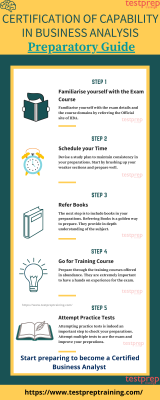
Step 1- Familiarise yourself with the Exam Course
The CCBA Certification exam covers 6 knowledge areas which are further divided into various domains. Familiarising yourself with all the objectives and course domains of the exam is an important step before moving forward with your preparations. Devote enough time to each topic and have in depth knowledge of the subject by tailoring your study focus around the course domains. Refer the official website of IIBA for further details on CCBA certification exam course.
Step 2- Devise a Study Plan
The next step is to strategize a study plan for your preparations. While devising the plan keep in mind the course topics and time duration left for the real exam. Remember to begin with strengthening your weaker sections. Moreover, devote enough attention to topics which have a higher weightage in the exam. Following your plan will help you remain consistent and also help in avoiding distractions. The key to excel is to start early, hence begin with your preparations and stay motivated.
Step 3- Books your ultimate friends
Books are the ultimate preparation materials. They provide a depth understanding of the exam course and offer you real-world application. IIBA offers handbooks that guide you towards the certification exam. There is IIBA CCBA Exam Handbook available. Additionally you can also refer to the CCBA exam books that are widely available in the market. Remember to opt from genuine and authentic resources
Step 4- Go for a Training Course
Training Courses provide you insights about the exam course and questions. They help you prepare for the exam with expert guidance and supervision. These courses can either be instructor-led or be online self-study. There are various CCBA exam online training courses that are available for your Certification of Capability in Business Analysis. Therefore, choose the one that best suits you and go on to advance your preparations.
IIBA offers its own training courses by IIBA Endorsed Education Providers (EEP™). All IIBA endorsed training is aligned with best practice standards internationally recognized including the BABOK Guide for our core BA certification program.
Step 5- Join the Community
Online CCBA Exam forums and study groups are indeed a great way of preparation. The best way to get in touch with other candidates is through study forums or online groups. Moreover, you can ask a question related to the topic you’re having difficulty with.
Also, such groups conduct regular discussions about the exams. These discussions are really beneficial for you to excel the exam.
Step 6- Attempt Practice Tests
Finally, it is time to check your preparations. Self-Evaluation is the key and hence your next step is to go for practice tests. The more you’re going to practice, the better for you. Moreover, these CCBA exam sample questions provide you with the real exam environment and also help you analyze areas that need improvement. Strengthening your weaker domains will surely help you pass with flying colors. Therefore, attempt as many practice tests as you can. Start using CCBA practice exam questions free tests now.

